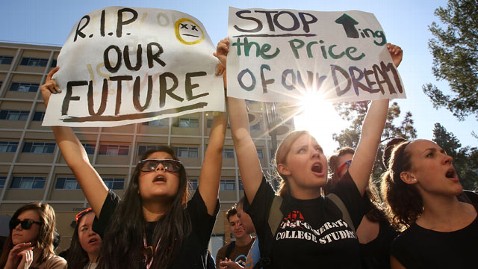Sequester Snapshot: Student Loans

University of California Los Angeles (UCLA) students Andrea Flores (L) and Kendall Brown (R) and other UCLA students and supporters demonstrate outside the UC Board of Regents meeting where members voted to approve a 32 percent tuition hike on November 19, 2009 in Los Angeles, California. David McNew/Getty Images
That includes cuts to some federal work-study programs and reductions in payments to millions of student loan borrowers, although the exact detail and timeline remain unclear.
During the White House briefing Wednesday, Secretary of Education Arne Duncan warned of the dire effects sequestration could have on federal higher education funding.
RELATED: Pre-Sequester Pink Slips? Duncan Stretches Impact on Teachers
"That ($86 million cut) would mean for the fall as many as 70,000 students would lose access to grants and to work-study opportunities," Duncan said during the briefing. "And if young people lose access to grants and lose access to work study, my fear … is many of them would not be able to enroll in college, would not be able to go back. And, again, do we want a less-educated workforce?"
Though funding for federal Pell Grants are protected from sequestration, funding for federal work study grants would be cut by $49 million and supplemental educational opportunity grants by $37 million, according to the Department of Education.
In a Feb. 1 letter to the U.S. Senate on Committee Appropriations, Duncan also noted that the ability for the Department of Education to collect and service student debt to borrowers once they left school "would be hampered" by the cuts.
For U.S. Student Association President Tiffany Letin, who graduated with nearly $28,000 in student loan debt, the cuts are detrimental to the future of higher education funding.
"President Obama came out in his state of the union address and inauguration speech saying we should support students financially," Letin said. "But the sequestration and budget contradict this - our states don't get the funding they need to have lower costs for textbooks and keep faculty and staff at our colleges and universities."
The association will be holding a national conference in Washington D.C. with more than 350 students from March 14 to 18 to discuss student loan debt and issues regarding undocumented students. Students will practice effective lobbying and put their skills to the test on March 18 by rallying for better funding for higher education.